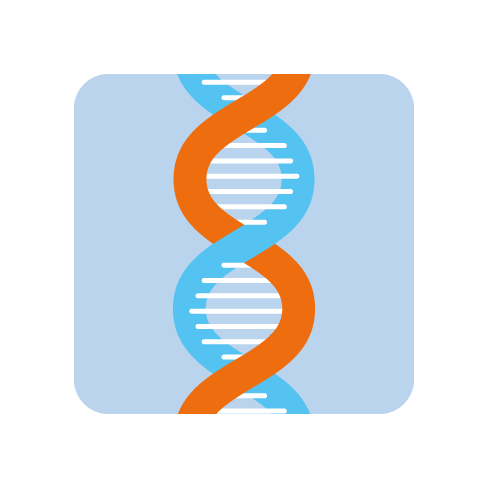 life sciences
life sciences healthcare
healthcare AI・IoT・robotics
AI・IoT・robotics education
education environment・energy
environment・energy food・agriculture
food・agriculture material
material


Research Background
In today’s society, people have comparatively more economic wealth and live a life surrounded with many more things than in the past, but it is not necessarily true that they are happier. Depression among the working population has resulted in a troubling increase of suicides, people leaving their jobs, and shut-ins. The unprecedented circumstances of the current COVID-19 crisis has raised chronic stress. Early detection of depression and the establishment of preventable measures have become global societal challenges.
Also, in the manufacturing world, manufacturing technology has been progressing along the axes of economy and efficiency, but to develop things and services that the modern person will use, it’s necessary to focus on the inner changes such as the improved satisfaction and spiritual value felt by the user.

Research Contents
At Hiroshima University, we believe in the importance of science to explain the mechanisms by which emotions are generated to cope with today’s diverse array of social issues. That is why we established th e Brain, mind and kansei Science Research Center (hereafter referred to as “BMK Center”*) in October 2018, headed by Professor Yasumasa Okamoto. The BMK Center is the world’s only research hub for studying the brain’s positive and negative perceptions.(http://bmk.hiroshima-u.ac.jp/)
The BMK Center’s mission is to research the brain, mind and perception — the essence of human existence — and establish perception science as an independent academic discipline that integrates medical science, engineering, information science, humanities and social sciences, brain function measurement, and control sciences, with brain science at its center. The new graduate program will help nurture and educate tomorrow’s specialists.
The BMK Center receives financial support from the following public organizations:
- – The Ministry of Education, Culture, Sports, Sciences and Technology (MEXT), Radical Innovation and Entrepreneurship Program
“Perceptual Innovation Hub for Spiritual Growth” http://coikansei.hiroshima-u.ac.jp/
- – Japan Agency for Medical Research and Development (AMED), Strategic Research Program for Brain Sciences
“Depression Research Center” https://www.amed.go.jp/program/list/15/01/002.html
The Image of Social Implementation and Corporate Tie-ups
Negative kansei
In the field of negative perceptions, with Specially Appointed Professor Shigeto Yamawaki, the chief of the International Affectome (emotion) Research Center, at the center, researches are conducted with the aim of social implementation in the healthcare realm.
(1) Preventing depression (strategies to combat stress)
(2) Preventing bullying, combatting game and gambling addiction
(3) Evacuation measures in an emergency, and mental healthcare
Positive kansei
In the field of positive perceptions, our goal is industrial application by bringing perceptual value to the products and services areas. Takafumi Sasaoka, associate professor of Hiroshima University BMK Center and COI research leader, and his team of researchers are partnering with corporations and developing applications and services detailed below to promote; 1) new product and service development, 2) productivity improvement, and 3) educational and other usage.
Social Implementation
This research implements objective evaluations based on brain science in various sectors including mental health, business, and education, providing the possibility to create new business that goes beyond the usual constraints. Visiting Professor Hidetoshi Yoshida (COI project leader), who has achieved business management results in the real world, is the central contact for businesses in this research, forming a system that will bring about the commercialization and social implementation of the results of this research with breakthrough products and services.
For those interested in the research described above, please contact us from the link below.
From Hiroshima Prefecture. After graduating from Oita Medical University Faculty of Medicine, he entered a hospital affiliated with the Hiroshima University Faculty of Medicine and the National Hospital Organization Kure Medical Center. He has been in his current position since 2018. His specialties are mood disorders, brain-image research, and cognitive behavioral therapy. Outside of the university, he serves as the director of both the Japanese Society of Mood Disorders and the Japanese Society of Biological Psychiatry.

From Hiroshima Prefecture. After graduating from Hiroshima University Faculty of Medicine, he entered a hospital affiliated with the Hiroshima University Faculty of Medicine, served as a technical official of the Ministry of Health, Labour and Welfare at the National Hospital Organization Kure Medical Center, and worked in the research laboratory at the University of Washington School of Psychiatry in the US. He became a professor at Hiroshima University Faculty of Medicine in 1990. He was appointed as the vice director of Hiroshima University in 2012. He also became a professor at Vienna University Faculty of Medicine in 2016. While becoming an emeritus professor in 2017, he also became a specially appointed professor of Hiroshima University’s Social-Academia Collaboration Office. He has been in his current position since 2020.
His specialties are psychiatry, mood disorders, and brain science.
Outside of the university, he serves as the union representative for the Union of Brain Science Associations in Japan, and the director of the Japanese Society of Neuropsychopharmacology, the International College of Neuropsychopharmacology (CINP) and the International College of Geriatric Psychoneuropharmacology (ICGP).

From Ehime Prefecture. After receiving his doctoral degree from the Kyoto University Graduate School of Informatics, he became a special researcher at the Kanazawa Institute of Technology Human Information Systems Laboratory, an assistant professor at the Kyoto University Graduate School of Informatics, a specially appointed assistant at the Hiroshima University School of Biomedical and Health Sciences and took on his current position.
His specialties are cognitive psychology and cognitive neuroscience.
He serves as a research leader of the Radical Innovation and Entrepreneurship Program (COI) (hub name: Perceptional Innovation Hub for Spiritual Growth) by M inistry of Education, Culture, Sports, Science and Technology (MEXT) and JST.

From Tokyo. After graduating from Sophia University, he entered Victor Company of Japan Ltd. (currently JVC Kenwood Corp.) and became its chief executive officer, and the executive vice president, executive officer, and general manager of the sales division of Optrex Corp. He served as the chief executive officer and executive director of ELNA Co., Ltd., and as the chief executive officer and representative executive officer of VAIO Corporation, and took on his current position in 2019. He has had a long career in international marketing and management in the electronics sector.
